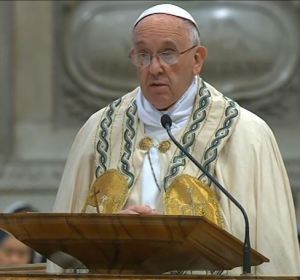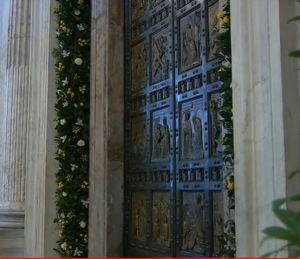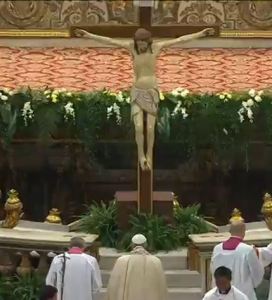Pope: Mercy is “the beating heart of the Gospel”by Cindy Wooden |

Pope Francis preaches in St. Peter's Basilica, explaining why he's called a Holy Year. (Screen grab)
VATICAN CITY -- Pope Francis formally presented his official proclamation of the 2015-2016 extraordinary jubilee or Holy Year of Mercy this evening before celebrating vespers in St. Peter’s Basilica.
The proclamation, called a “bull of indiction,” is titled “Misericordiae Vultus” (“The Face of Mercy”) and explains how in Jesus Christ, in his words and actions, the mercy of God has been revealed.
Pope Francis said in the document that he wants the year, which will begin Dec. 8, to be a time for Catholics to contemplate just how merciful God has been to them and to understand better how they are called to be merciful to others in turn.
Mercy, the pope wrote, is “the beating heart of the Gospel.”
“How much I desire that the year to come will be steeped in mercy, so that we can go out to every man and woman, bringing the goodness and tenderness of God,” he wrote. “May the balm of mercy reach everyone, both believers and those far away, as a sign that the kingdom of God is already present in our midst.”
Nothing in the church’s preaching or witness, he said, can be lacking in mercy.

The Holy Door at St. Peter's Basilica decorated this evening. (Screen grab)
Pope Francis asked that every diocese in the world designate a “Door of Mercy” at their cathedral or another special church or shrine, and that every diocese implement the “24 Hours for the Lord” initiative on the Friday and Saturday before the fourth week of Lent. In Rome the last two years, the pope has opened the celebration with a penance service in St. Peter’s Basilica and churches around the city were open for the next 24 hours for confessions and eucharistic adoration.
The pope said he will designate and send out “Missionaries of Mercy” to preach about mercy; they will be given special authority, he said, “to pardon even those sins reserved to the Holy See.” Under church law, those sins involve: a man who directly participated in an abortion and later wants to enter the priesthood; priests who have broken the seal of confession; priests who have offered sacramental absolution to their own sexual partners; desecrating the Eucharist; and making an attempt on the life of the pope. Usually, the Apostolic Penitentiary, a Vatican court, handles those cases.

Venerating the cross before vespers in St. Peter's Basilica. (Screen grab)
And he urged all Catholics to spend more time practicing what traditionally have been called the corporal and spiritual works of mercy. The corporal works are: Feeding the hungry, sheltering the homeless, clothing the naked, visiting the sick, visiting the imprisoned, giving drink to the thirsty and burying the dead. The spiritual works are: Converting sinners, instructing the ignorant, advising the doubtful, comforting the sorrowful, bearing wrongs patiently, forgiving injuries and praying for the living and dead.
Here is the Vatican’s translation of the prepared text of the pope’s brief homily this evening at first vespers for Divine Mercy Sunday:
Dear Brothers and Sisters,The greeting of the risen Christ to his disciples on the evening of Easter, “Peace be with you!” (Jn 20:19), continues to resound in us all. Peace, especially during this Easter season, remains the desire of so many people who suffer unprecedented violence of discrimination and death simply because they bear the name “Christian.” Our prayer is all the more intense and becomes a cry for help to the Father, who is rich in mercy, that he may sustain the faith of our many brothers and sisters who are in pain. At the same time, we ask for the grace of the conversion of our own hearts so as to move from indifference to compassion.St. Paul reminds us that we have been saved through the mystery of the death and resurrection of the Lord Jesus. He is the reconciler, who is alive in our midst offering the way to reconciliation with God and with each other. The Apostle recalls that, notwithstanding the difficulties and the sufferings of life, the hope of salvation which Christ has sown in our hearts nonetheless continues to grow. The mercy of God is poured out upon us, making us just and giving us peace.Many question in their hearts: Why a Jubilee of Mercy today? Simply because the church, in this time of great historical change, is called to offer more evident signs of God’s presence and closeness. This is not the time to be distracted; on the contrary, we need to be vigilant and to reawaken in ourselves the capacity to see what is essential. This is a time for the church to rediscover the meaning of the mission entrusted to her by the Lord on the day of Easter: to be a sign and an instrument of the Father’s mercy (cf. Jn 20:21-23). For this reason, the Holy Year must keep alive the desire to know how to welcome the numerous signs of the tenderness which God offers to the whole world and, above all, to those who suffer, who are alone and abandoned, without hope of being pardoned or feeling the Father’s love. A Holy Year to experience strongly within ourselves the joy of having been found by Jesus, the Good Shepherd who has come in search of us because we were lost. A Jubilee to receive the warmth of his love when he bears us upon his shoulders and brings us back to the Father’s house. A year in which to be touched by the Lord Jesus and to be transformed by his mercy, so that we may become witnesses to mercy. Here, then, is the reason for the Jubilee: because this is the time for mercy. It is the favorable time to heal wounds, a time not to be weary of meeting all those who are waiting to see and to touch with their hands the signs of the closeness of God, a time to offer everyone the way of forgiveness and reconciliation.May the Mother of God open our eyes, so that we may comprehend the task to which we have been called; and may she obtain for us the grace to experience this Jubilee of Mercy as faithful and fruitful witnesses of Christ.
No comments:
Post a Comment